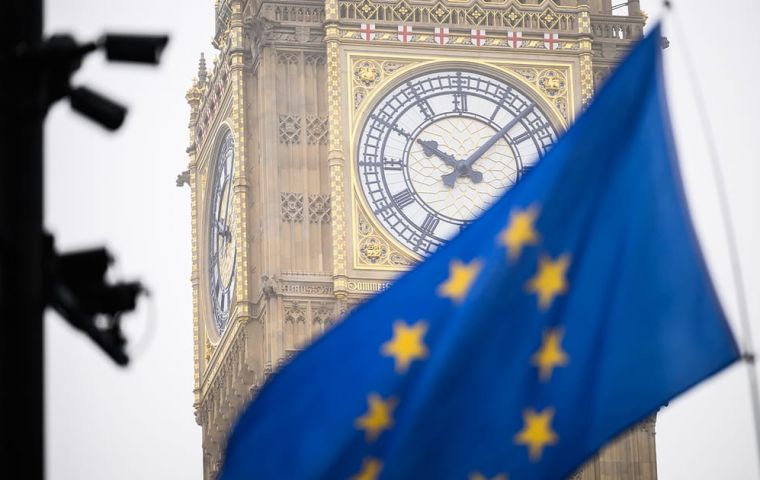MercoPress. South Atlantic News Agency
Debate in UK Parliament on impacts of Brexit; request for a public inquest
 A three-hour debate was held after 183,000 people signed a petition calling for a public inquiry into the impact of leaving the European Union.
A three-hour debate was held after 183,000 people signed a petition calling for a public inquiry into the impact of leaving the European Union. Brexit and its consequences is not a closed issue and remains very much alive. Not only did Scotland, Northern Ireland, Gibraltar reject Brexit, but other Overseas Territories such as the Falkland Islands have suffered from the 2016 initiative.
In effect several members of Parliament urged the UK government to launch a public inquiry to assess its effects during a legislative debate. A three-hour debate was held after 183,000 people signed a petition calling for a public inquiry into the impact of leaving the European Union.
The UK government insists Brexit was a “democratic choice” and dismissed calls for a public inquiry. But some MPs branded Brexit a “disaster” and an “error”.
The UK officially left the EU in January 2020 after a referendum in 2016 saw Leave beat Remain by a margin of 51.9% to 48.1%. The decision meant making big, structural changes to the relationship between the UK and the EU, with areas such trade, investment and immigration affected.
Some economists believe Brexit has had a negative effect on the UK economy, but other argue the benefits of leaving the EU will be seen over time.
On Monday in Westminster Hall MPs had an opportunity to discuss these issues, with most speakers criticising Brexit than those who backed it.
The discussion was led by Martyn Day, an SNP MP whose party wants an independent Scotland to rejoin the EU.
He said “concerns have been expressed that no impact assessment has been carried out to assess the damage that Brexit has created”.
He cited comments made by Richard Hughes, the chairman of the Office for Budget Responsibility, who recently said Brexit had been similar to the Covid pandemic in its impact.
The latest forecast by the OBR assumes Brexit will lead to a 4% reduction in the potential productivity of the UK economy, with the reduction building “over time with the full effect felt after 15 years”.
“The economic fallout from Brexit is stark,” Mr Day said.
“From my perspective, Brexit has been an unmitigated disaster—politically, economically and socially, for Scotland and the rest of the UK.
Mr Day said he backed the petition, which said ”the truth about Brexit“ can only be established ”by an independent public inquiry, free from ideology and the opinions of vested interests“.
Public inquiries are usually initiated by a government minister, who appoints an independent chair or panel to examine matters of public concern, and produce one or more reports.
One recent example is the public inquiry into the UK government's handling of the Covid pandemic, which is under way.
Liberal Democrat MP Wera Hobhouse said a public inquiry ”would help us face up to reality and it would give a true picture of the impact on people, business and the whole economy“.
Like Mr Day, she cited analysis by the OBR which, in its latest forecast, assumes that ”UK imports and exports will both be 15% lower in the long run than had we remained in the EU“.
The Liberal Democrats have said they would seek a closer economic relationship with EU if they were in government.
That position is anathema to Brexit-backing Conservative MPs like Adam Holloway, who spoke in favor of leaving the EU during the debate.
Mr Holloway said: ”In reality, we are arguing today about whether we should have voted to leave the EU or whether we should rejoin.“
The Tory MP said the biggest benefit of Brexit was that ”our sovereignty has been repatriated“.
He said EU membership had brought ”social problems“ and ”enormous stress on public services“, which some MPs in the room did not understand.
”It is easy to undervalue sovereignty if the areas in which it was surrendered to the EU do not actually impact one's life,“ Mr Holloway said.
”It is easy to disdain patriotism if someone is economically and socially mobile and derives their self-worth from a well-paid job, or if their life is made easier by cheap labor as a result of free movement.“
Leo Docherty, Conservative MP for Aldershot, was the minister put forward to represent the government in the debate. He said the government did ”not believe that it would be appropriate to hold an inquiry into the impact of Brexit“.
He said: ”Britain left the EU to do things differently and make our own laws, but this was not just political theory: our laws and tax framework and the way we spend our money all make a real difference to people's lives.”




Top Comments
Disclaimer & comment rulesCommenting for this story is now closed.
If you have a Facebook account, become a fan and comment on our Facebook Page!